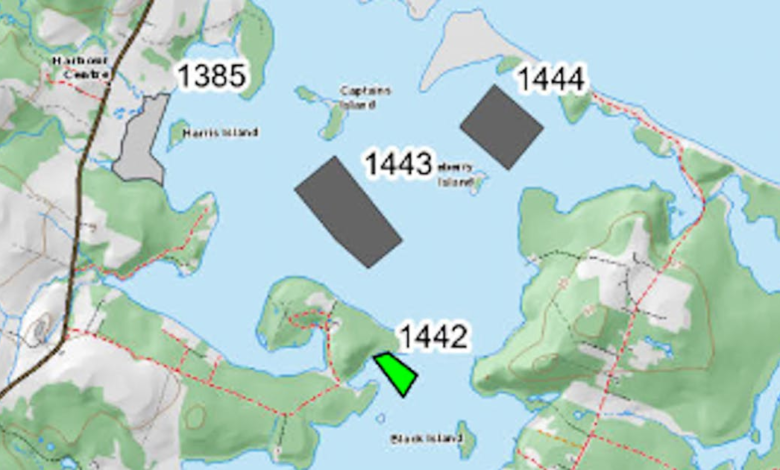Antigonish oyster farm gets green light despite opposition

Town Point Consulting’s application to build an oyster farm on Antigonish Harbour has been approved by the Nova Scotia Aquaculture Review Board.
It comes after a three-year process that included 143 written submissions, four days of hearings and significant acrimony.
“They are, for the most part, sincere, although a few unfortunately engaged in personal attacks on the transparency and integrity of (Town Point Consulting) and Ernie Porter,” reads the review board decision that was critical of efforts by those opposed to the project to attack the proponent’s integrity.
The former president of Lindsay Construction bought land at Town Point on Antigonish Harbour, built a house and plans to build an oyster farm, along with his wife and family, on three water leases, with a depuration facility and other facilities onshore.
The three approved leases give Town Point Consulting nearly 37 hectares of total water surface area to operate their custom farming technology. The system will see cylindrical cages bearing oysters on lines spaced 10 metres apart.
The farm is projected to employ 10 people growing two to three million oysters annually.
The farm was opposed by a group of concerned citizens, neighbours of Porter, environmental advocates and commercial fishermen who transit through the harbour.
Opposition to the project has been led primarily by the group Friends of Antigonish Harbour.
They wrote and presented at the hearings their concerns that included worries it would negatively affect fish and bird habitat, would impede recreational and commercial boaters from transiting the harbour, would hurt tourism, lower property values and make for a bad view.
“Several submissions were received regarding the potential impact on Mi’kmaq rights and concerns,” noted the decision.
“As well, Mr. Bowler (member of Friends of Antigonish Harbour) in his application for intervenor status, expressed concerns for First Nations access to the harbour. One written submission expressed such concerns, however, Paqtnkek Mi’kmaw Nation, which farms oysters in Pomquet Harbour, submitted strong support for the project.”
Friends of Antigonish Harbour relied heavily on the submission by professor Peter Cranford, a retired research scientist with Fisheries and Oceans Canada who currently runs Emeritus Marine.
A report commissioned by Cranford said there wasn’t enough flushing of Antigonish Harbour to support the three million oysters Town Point aims to grow. He also found that their presence could deplete oxygen in the water, leading to fish kills.
His evidence ran counter to that of David Garbary, a biologist and professor at St. Francis Xavier University, and Jon Grant, a biological oceanographer at Dalhousie University, both of whom found adequate flushing of the harbour.
“Dr. Grant’s calculations suggest that the proposed three million oysters included in the proposed lease could filter 18 million litres of water per day,” reads the decision.
“The time required to filter the entire harbour would be 83 days. In comparison, the tidal prism renewal time for the harbour is 0.76 days. As such, the tide renews harbour water 109 times faster than 3,000,000 oysters could deplete it. Essentially, the proposed volume of oysters can only filter 1.2 per cent of the harbour water per day. He concluded that this degree of variation is ‘noise’ and could never be detected in a sampling program, and as such 3,000,000 will not result in a significant drawdown of phytoplankton.”
Both Grant and the review board were critical of Cranford’s report, which relied on “about one day” of monitoring from three current monitors placed in the middle of each of the proposed three lease sites.
“We therefore conclude Dr. Cranford’s methodology was fundamentally flawed and cannot agree with the Intervenor Groups 1 and 2 position that he is the most important witness since he applied scientific principles to the actual site,” reads the decision.
“In relying on so little data and drawing such extreme conclusions we consider basic scientific principles to have been ignored rather than relied upon.”
The board also heard submissions from recreational boaters, commercial fishermen, and oyster growers who supported the project.
The Board’s approval requires Town Point Consulting to develop a farm management plan that will allow for a 250 metre buffer between operations and piping plover habitat at Dunn’s Beach, along with an impact mitigation and monitoring plan. Town Point will also have to monitor its impact on eel grass beds in the farmed areas and “make any necessary adjustments to its cages and equipment” to ensure they don’t interfere with existing wild oyster harvesting.
Similarly, Town Point is ordered to adjust the layout in one of its lease sites to allow commercial fishing boats to transit from a northern route into the harbour.



